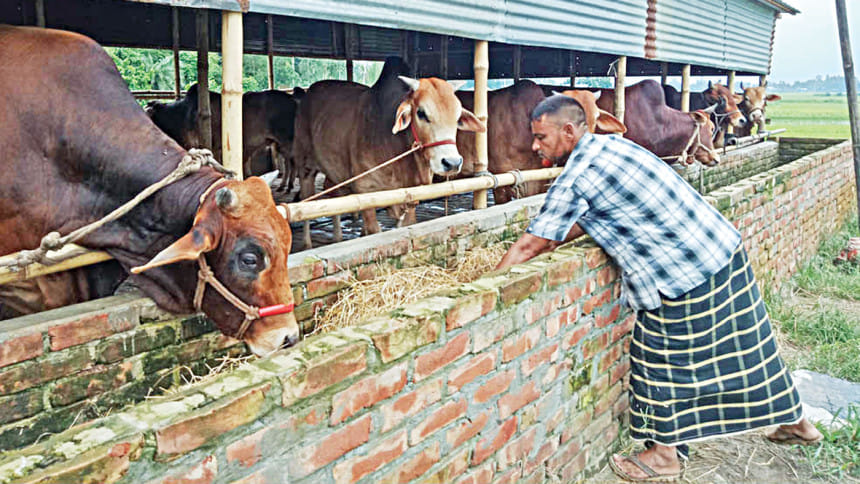Cattle traders in a blue funk as Covid rages on

The worsening Covid-19 situation has generated apprehensions among cattle farmers of Sirajganj and Pabna, two of the biggest cattle rearing hubs of the country.
The lockdowns and restrictions on movement have got them wondering whether there would be enough customers and markets available to recoup their investments through sales during Eid-ul-Azha this year.

Though some are opting for marketing their animals through online platforms, most are looking forward to the traditional markets since they are more used to that mode of trade.
Md Sirajul Hossain of Barabeel village in Shahzadpur upazila of Sirajganj has fattened nine cows, investing around Tk 22 lakh.
With only a couple of weeks to go before Eid, no cattle trader has contacted him. This has dampened his hopes of making sales anywhere between Tk 25 lakh to Tk 30 lakh.
"Last year I prepared six cows ahead of Eid and sold to cattle traders of Narayanganj three weeks prior to the festival," said Hossain.
"If I do not make a sale in the festival, I have to opt for butchers," he said.
"Due to uncertainty over whether traditional cattle markets would be opened, I have started selling cattle through online platforms such as Facebook and YouTube," said Md Abdul Kader of Haropara village in Pabna's Vangura upazila.
Kader prepared 117 cattle and sold 27 through online platforms last week. He expects to sell the rest in the same way.
"I have prepared two bulls in my house targeting to get handsome prices ahead of Eid. Due to poor market facility, I did not take the bulls to the market and nobody has offered a good price," said Md Saban Ali of Maligasa village in Pabna sadar upazila.
Contacted by The Daily Star, Jinnat Sultana, deputy director of the Department of Livestock Services, however, said due to the Covid-19 situation, they were suggesting operating cattle markets in wide and open spaces following health guidelines.
"The local administration will take necessary steps as per government orders," she said.

She assured that there was nothing for the cattle traders to be worried about as the government had stuck to a decision to not let Indian cattle enter centring the festival for the alarming condition in the neighbouring country.
"The Ministry of Fisheries and Livestock has already issued an order to each of the divisional headquarters and district administrations so that no Indian cattle enters during Eid," she said.
There is a sufficient number of cattle available in the local farms across the country to meet demand, she added.
According to the livestock department, 1.19 core sacrificial animals have been prepared this year across the country.
Of them, 45,47,000 were cows, 73,65000 goats and lambs and 4,765 others.
"Last year 95,000 animals were sacrificed while we are expecting 99.22 lakh animals to be sacrificed this year," said Sultana.
"But marketing of cattle is a big concern for cattle farmers and traders in the Eid market due to the alarming Covid-19 situation so we are encouraging cattle farmers to go for online marketing," she said.
Online Marketing
Haropara, a remote village in Pabna's Vangura upazila, has set an example of selling sacrificial animals in online markets. There are about 150 cattle farmers in the village dependent on online marketing.
"We are preparing videos of our animals and posting those in online platforms such as Facebook and YouTube using our contacts," said Shahabul Islam, owner of ABC Cattle Farm.
"Seeing the videos, buyers are contacting us and paying money through banks. We are then loading animals onto trucks and sending those to the respective addresses," he said.
He said he often buys cows from farmers running operations on a small scale and has been selling those through online platforms over the last couple of years.
"Last year I have sold 100 cows in this way. This year I am expecting to sell more but only a small number of buyers have contacted me for the strict lockdown. It is mostly big merchants who are contacting us," he added.
Md Ashraful Alom, another trader using online markets, however, said different big companies were buying cattle from them through online transactions but were waiting to take delivery at the last minute.
"Most big companies buy sacrificial animals through online platforms and pay a charge for maintaining the animal in our farms," he said.
"They will, however, take the delivery on the last week of the festival and sell to other big buyers at a handsome price," Ashraful said.
Price Soars
Prices of cattle has soared rapidly by some 20 per cent to 25 per cent this year due to rising production cost, according to the cattle farmers and traders.
"I bought five healthy bulls eight months ago, each for Tk 1 to Tk 1. 5 lakh," said Sirajul Islam, a cattle trader of Sirajganj's Shahzadpur upazila.
"I spent Tk 60,000 to Tk 70,000 for feed and medicine of each. Now I expect to get Tk 2.3 lakh to Tk 2.5 lakh for each of the bulls that weigh approximately 8 to 10 maunds (one maund equals around 37 kilogrammes)," he said.
According to the cattle farmers and traders, an animal weighing anywhere from three to five maunds was selling for around Tk 70,000 to Tk 1.25 lakh.
Anything half that size was available for approximately Tk 22,000 to Tk 25,000.
But prices usually depended on the likings of customers, they said.
Md Johurul Islam, a businessman of Pabna, said he was yet to buy a bull for he did not get one of his liking.
"A three maund bull costs over Tk 70,000. As a man of a middle-class family, I cannot afford that much yet I have to sacrifice an animal," he said.

 For all latest news, follow The Daily Star's Google News channel.
For all latest news, follow The Daily Star's Google News channel. 



Comments